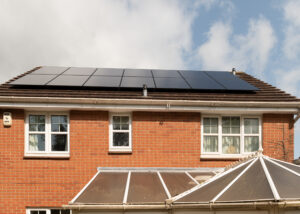A Guide to Solar Panels with Energy Saving Trust
18 August 2023

Everything you need to know about powering your home with solar panels.
Energy Saving Trust has recently published its comprehensive ‘Guide to solar panels’. Curated by energy experts, the guide is a walk-through of everything you need to know about solar panels, including how the technology works, typical costs and savings, and how to find an MCS certified installer.
Energy Saving Trust is a respected and trusted voice on energy efficiency and clean energy solutions. Working with government and businesses, they develop transformative energy programmes to help create a sustainable future.
We caught up with Joanna O’Loan, from Energy Saving Trust’s Insight & Evaluation team, to learn more about the guide and how it can benefit consumers.

About the guide
The purpose of the guide is to equip consumers with everything they need to know to make an informed decision on whether solar panels are the right choice for them. The guide is easy to understand and covers everything you need to know about a typical solar PV system. It also provides information on combining solar with other renewable technologies for heating and hot water.
The guide offers information on how the technology works, potential costs and savings, and steps on how to find a trusted installer. Regardless of what stage you’re at in your solar panel journey, the contents of the guide will help you build on your existing knowledge and take your next step towards installation.
The benefits of solar
There are many benefits to installing solar panels in the home. Consumers are looking for an energy source that provides lower bills, reduces their carbon footprint and is relatively hassle-free to install – solar panels can tick all these boxes. It comes as a surprise to most people that the installation process is relatively simple and requires little maintenance. Installations can be completed within two or three days, and panels can last over 20 years!
In addition to cutting electricity bills, solar technologies can also provide additional payments to the consumer. Solar panels can in fact generate more electricity than you use in the home, with the surplus being exported to the grid. Make sure to sign up for an export tariff that pays for the electricity you send to the grid – a Smart Export Guarantee (SEG) tariff is one option!
If you have an unshaded roof that faces east, south or west, there’s a good chance that your home is suitable for solar panels. However, if you are unsure, an MCS installer will be able to assess all the factors and advise you on the most appropriate call to action. It is worth noting that the majority of homes require no planning permission for a solar PV installation, as it is considered a ‘permitted development’, although we advise to check with your local planning office.
The importance of an MCS certified installer
An MCS certified contractor will be able to advise you on the most appropriate size and model of system to suit your home and your energy needs. Being MCS certified, demonstrates that a contractor installs renewable energy and heating systems to industry-expected levels of quality every time.
Another advantage is that an installation by an MCS certified installer also qualifies you for a Smart Export Guarantee (SEG) tariff.
To learn more about solar panels, download Energy Saving Trust’s solar guide for free here.
Looking to get solar panels for your home? Find an installer using our tool here.
